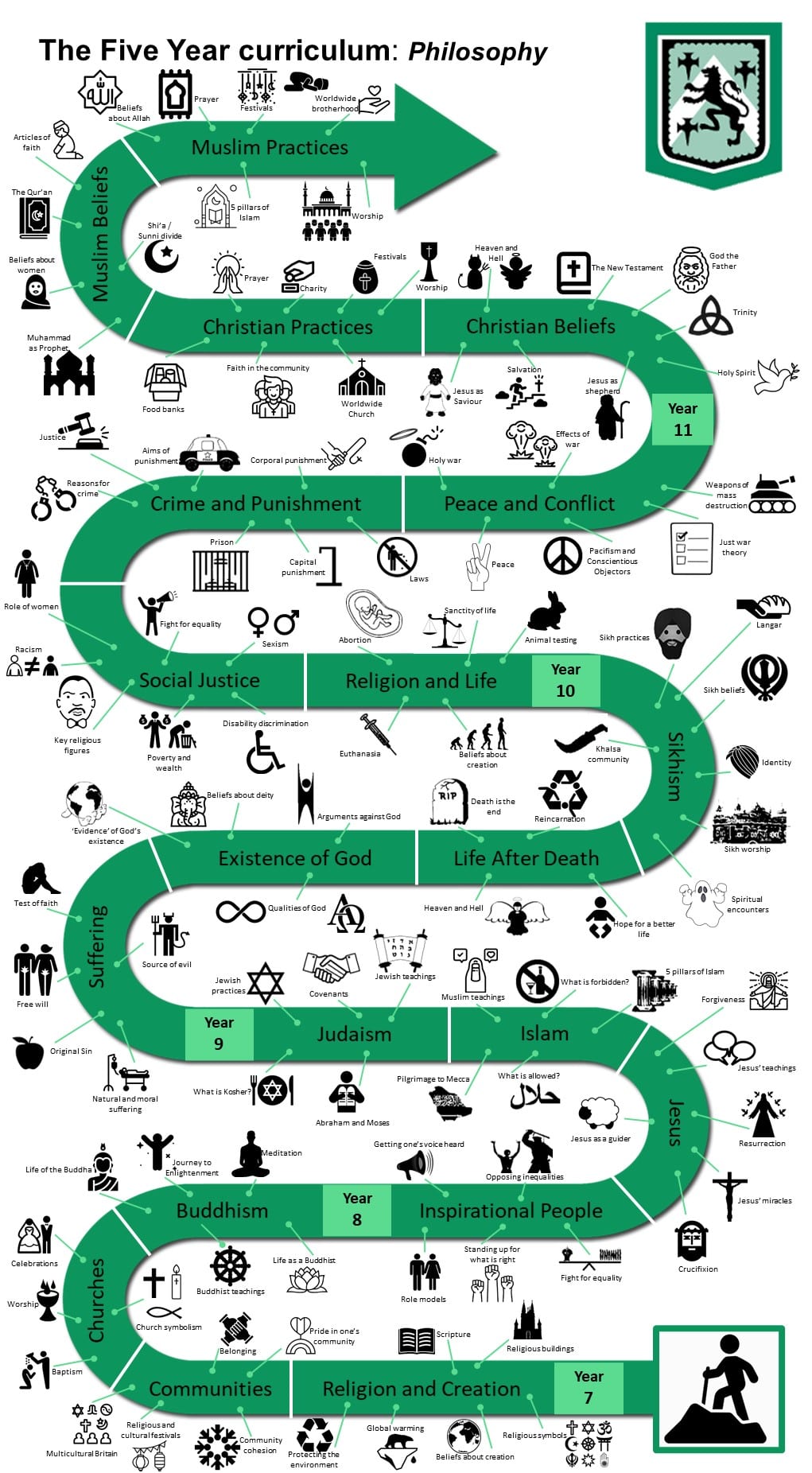Philosophy, Religion and Ethics Intent
In Philosophy, Religion and Ethics, pupils will have the ability to explore the diverse and multicultural nature of contemporary British Society, along with having the opportunity to challenge ideas about God, belief, purpose and ‘truth’. Whilst the main religious tradition in Great Britain is Christianity, pupils will look at British Values and world religions, to develop an understanding of how different faiths can help shape our culture, and the impact that religious figures have had on society throughout time. Pupils will also investigate other, non-religious world views, such as humanism and atheism, to gain a greater understanding of the wider world we live in.
If you require any further information, please contact the Head of Subject via the link on our Contact Us page.
YEAR 7
Pupils are introduced to the questions that Philosophy, Religion and Ethics tries to answer. Pupils are encouraged to express their own views, as well as investigating different religious and non-religious perspectives and world views. Pupils study topics including Theories of Creation, Introduction to World Religions, Churches and Buddhism. Pupils are encouraged to question what makes people belong to a religion, and what impact faith can have on a person’s way of life.
YEAR 8
Pupils will continue their exploration into Philosophy, Religion and Ethics. Year 8 pupils will examine a wide range of topics, with the focus being on people, and how faith can influence one’s actions. The topics which pupils study include Inspirational People, Racism, Poverty, Jesus, Moses and Abraham. Through these topics, pupils should gain a greater understanding of how some world religions were created, and how their teachings still have an impact throughout the world today.
YEAR 9
Pupils begin to explore Philosophical and Ethical issues in greater depth. A key focus across the year will be enabling pupils to gain the skills to critically address ‘Big Questions’, such as, ‘What is reality?’ and, ‘What makes us human?’. Year 9 pupils will explore the concepts of ‘good’ and ‘evil’, and how different religions may respond to the issue of suffering. Pupils will look at both religious and secular views on the existence of God, giving them the opportunity to discuss their own opinions, and develop their understanding as to why people may have different beliefs to their own.
Pupils will study the new AQA Specification A Religious Studies.
They will complete the following units over the two year course, and will sit 2 x 1 hour 45 minute exams at the end of year 11.
The GCSE is 100% examination-based, with no coursework element.
Beliefs, Teachings and Practices of Christianity and Islam
Theme B: Religion and Life
Theme D: Religion, Peace and Conflict
Theme E: Religion, Crime and Punishment
Theme F: Religion, Human Rights and Social Studies
AS/A Level: OCR GCE Religious Studies
This specification builds on the knowledge, understanding and skills that candidates may have
developed through the study of GCSE Religious Studies. It does not, however, assume or require
any previous study of the subject. It is designed to support a course of study which is suitable for
candidates from any religious background (or none).
Students will develop the following skills:
• Recalling, selecting and deploying specified knowledge
• Identifying, investigating and analysing questions and issues arising from the course of study
• Using appropriate language and terminology in context
• Interpreting and evaluating religious concepts, issues and ideas, the relevance of arguments and the views of scholars
• Communication, using reasoned arguments substantiated by evidence
• Making connections between the areas of study and other specified aspects of human experience
In addition, the Advanced GCE specification requires candidates to demonstrate a wider range and greater depth of knowledge and understanding, a greater maturity of thought and expression and more developed analytical skills.
Yr12
AS: Students study units G571 and G572:
G571 Philosophy of Religion:
• Ancient Greek influences on philosophy of religion
• Judaeo-Christian influences on philosophy of religion
• Traditional arguments for the existence of God
• Challenges to religious belief
G572 Religious Ethics:
• Ethical theories; Utilitarianism, Kant, Natural Law, Christian Ethics, Situation Ethics.
• Applied ethics topics; Abortion, Euthanasia, Genetic Engineering, War and Peace.
1.5 hours, written examination (100% of total AS marks, 50& of total A2 marks). Candidates will answer two questions from a choice of four.
Yr13
A2 Level: Students study units G581 and G582
G581 Philosophy of Religion:
• Religious language
• Experience and religion
Life after death
• Nature of God
• Miracles
G582 Religious Ethics:
• Meta-ethics
• Free will and determinism
• Conscience
• Virtue ethics
• Applied ethics topics; Environmental Ethics, Business Ethics, Sexual Ethics
In A2 units, candidates are expected to display knowledge, understanding and evaluative skills in respect to the specified topics. They are asked essay-style questions in which they may be expected to use material from more than one area within the unit, to draw comparisons and to assess the relative significance of different aspects of the unit. The questions direct candidates towards the Assessment Objectives, but candidates are expected to select their own material and structure it themselves into a coherent answer.
